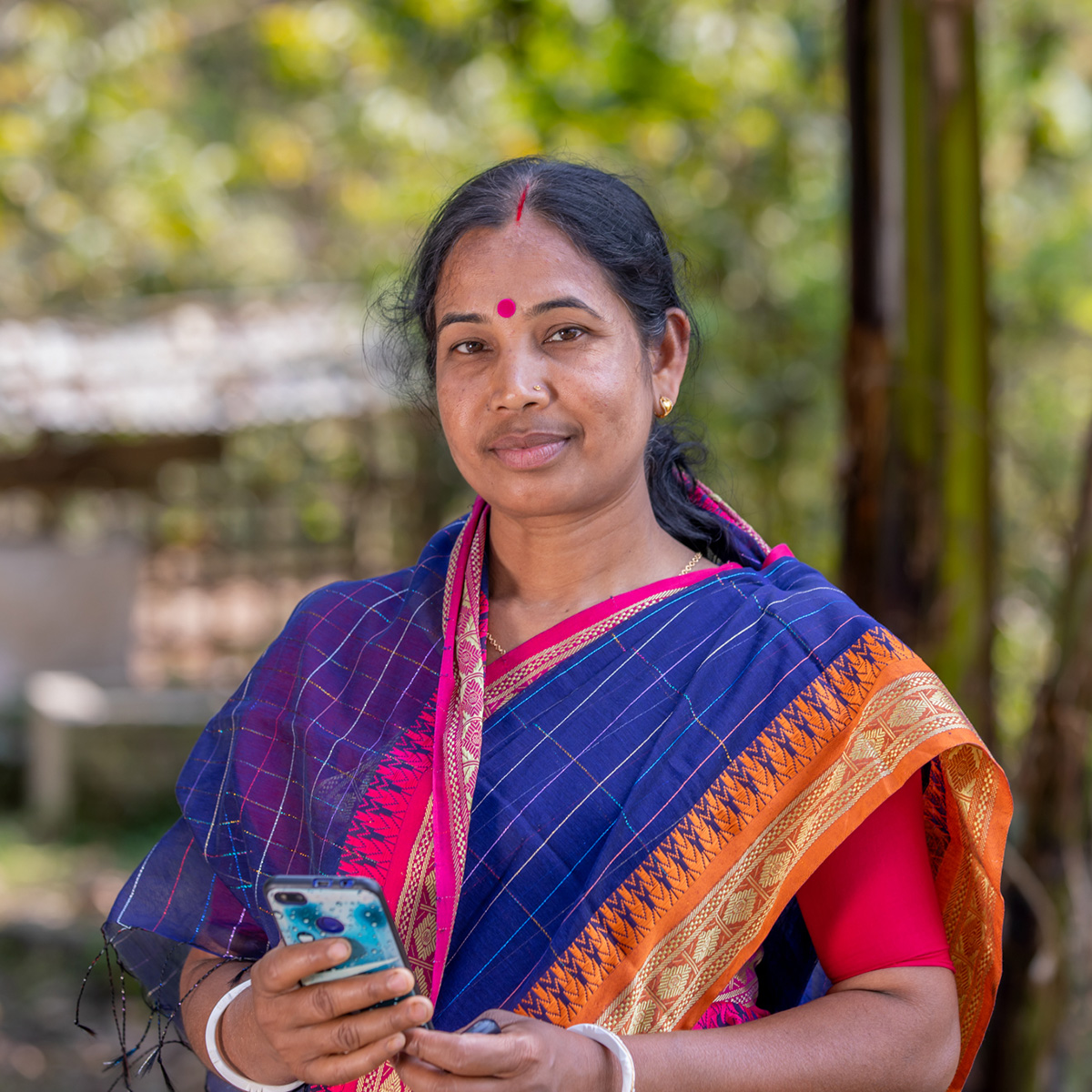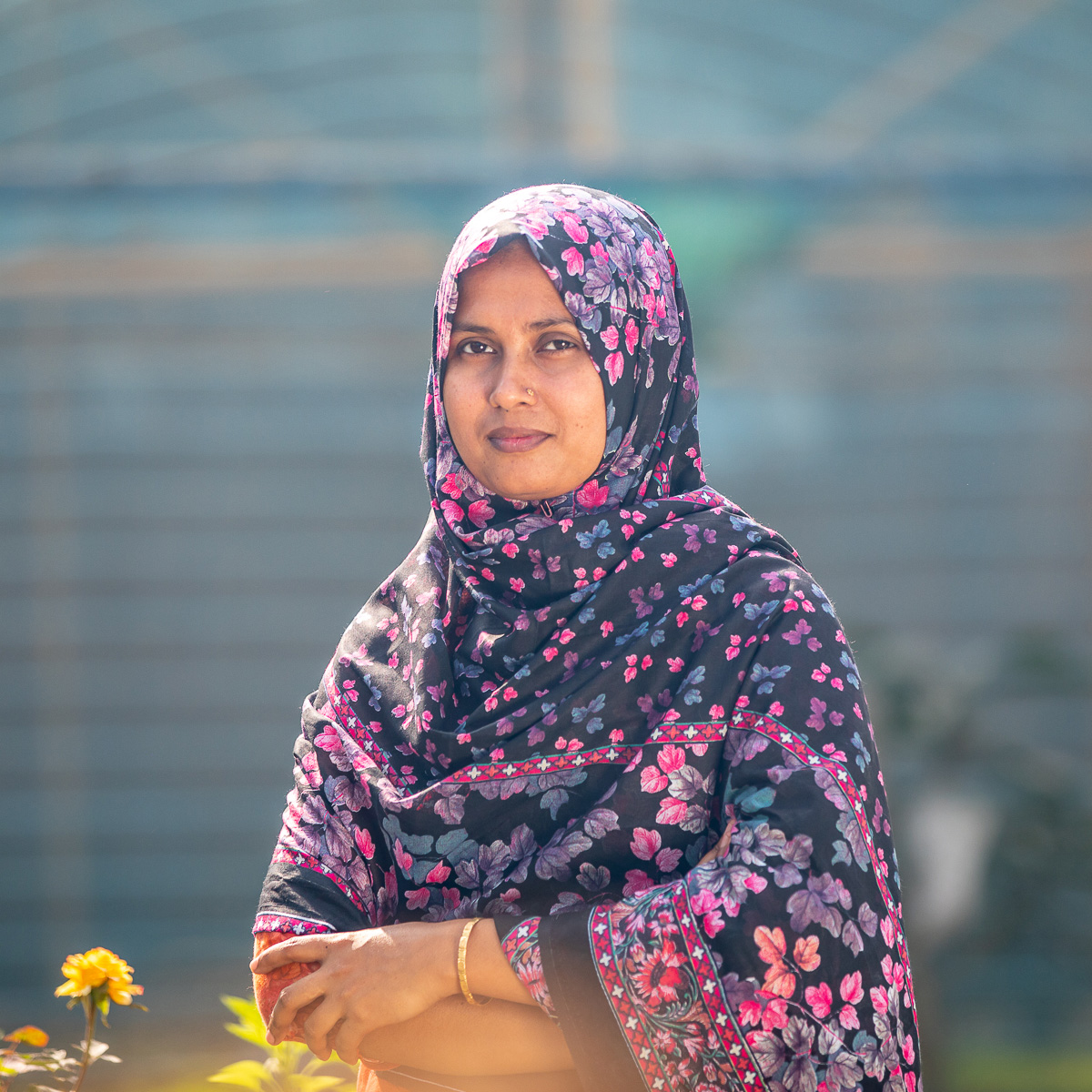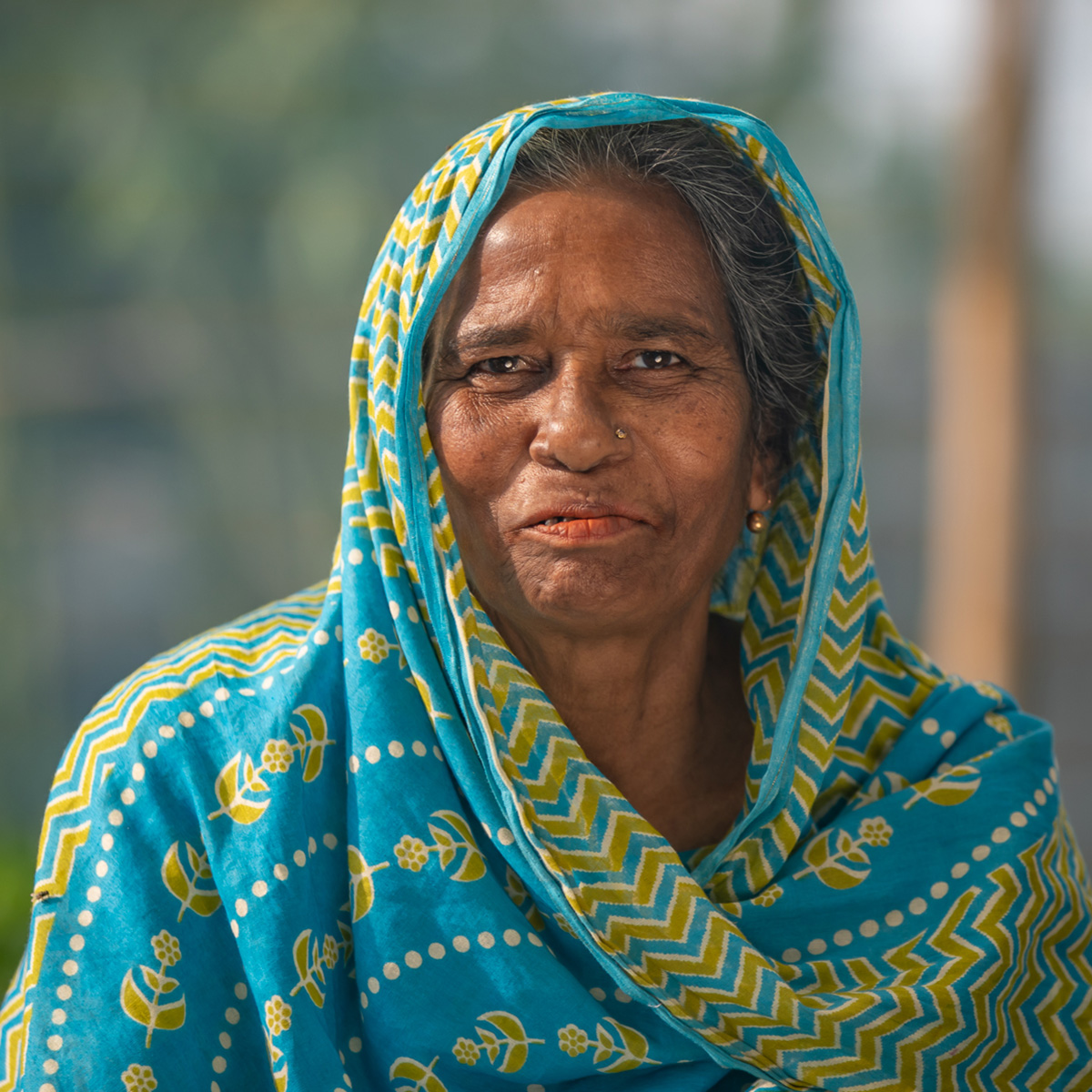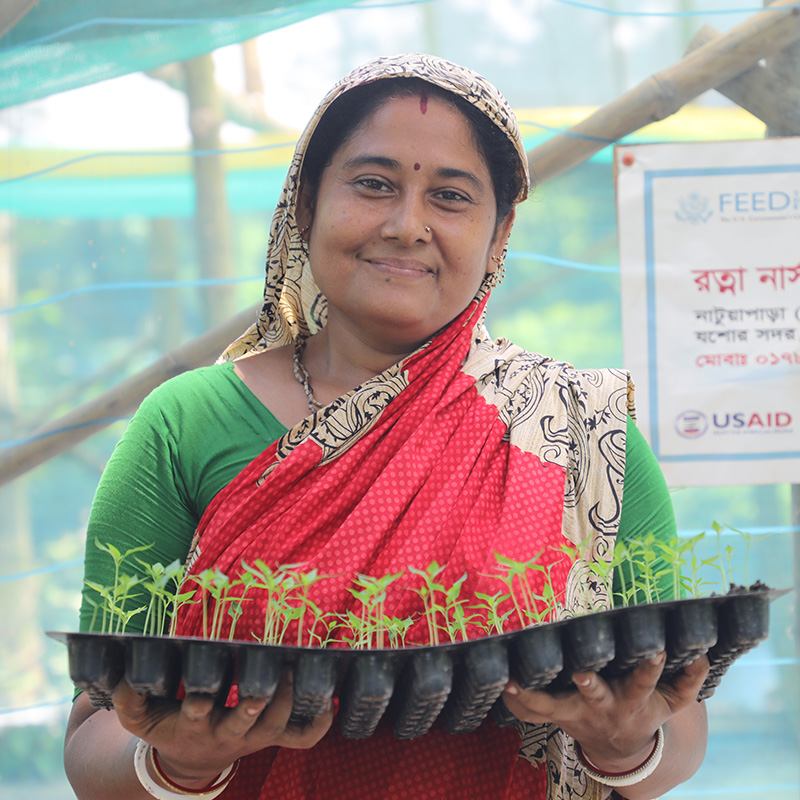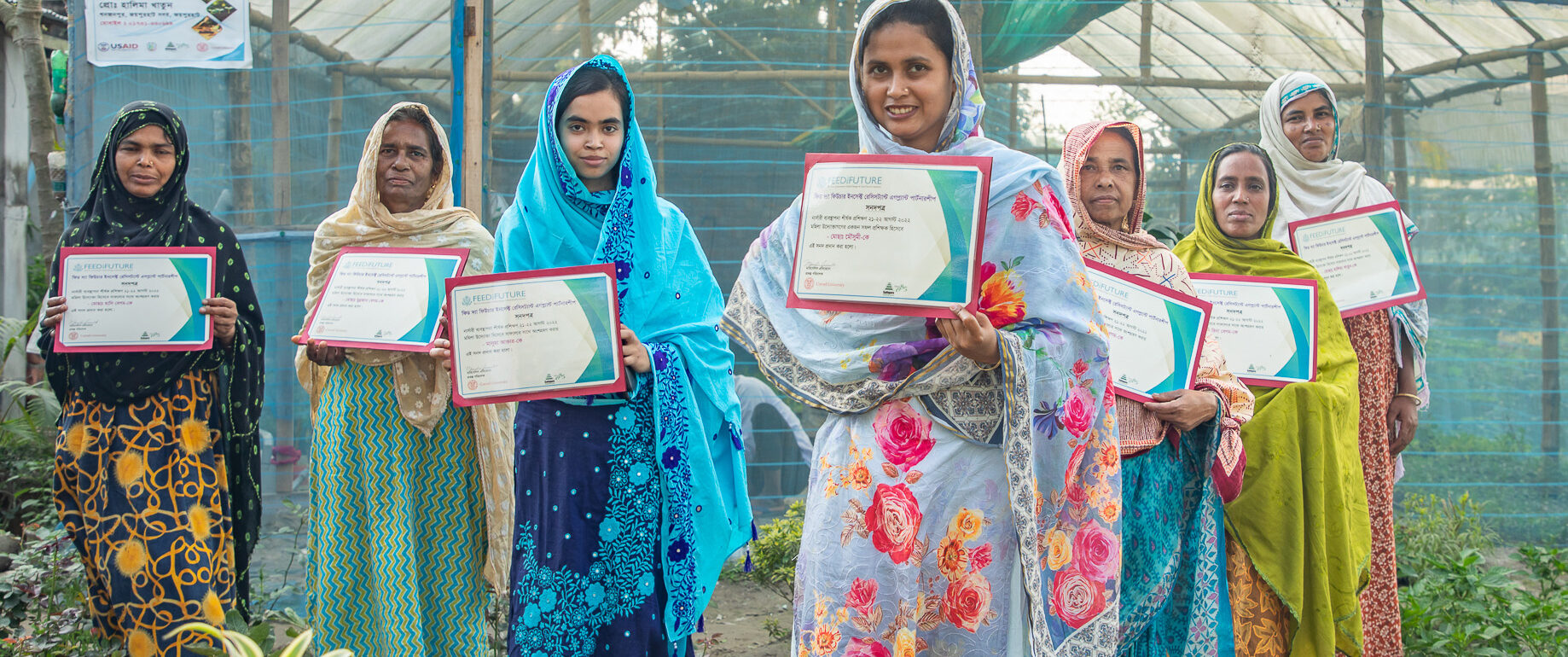
In her rural village in Bangladesh, Moushumi Akhter provides childcare for neighborhood kids out of her small stone home. While it does not bring much in the way of income for her family, the 29-year-old Akhter relishes nurturing children, and the colorful assortment of books in her home gives young minds the chance to read in Bangla and English.
But being a mother and a teacher in Bangladesh left her little opportunity to take an assertive role in her family finances.
That all changed with the construction of a plant nursery in March 2022 on land behind her home. Nestled among the rows of vegetables in her family garden, the nursery is providing Akhter a chance to grow in new ways: as an entrepreneur in control of her own finances while selling seedlings of Bt eggplant and other crops to local farmers and neighbors.
Women Entrepreneur Program
34
4
The program, an initiative by the Feed the Future Insect-Resistant Eggplant Partnership (IREP) to support women entrepreneurs, is pioneering plant nurseries as a catalytic resource for food and economic security in the country. Farmers in Bangladesh rely on nurseries to build flexibility into their cropping seasonal planning and deal with unpredictable rains. The Women-led Nursery Enterprise Model is laying a pathway for improved social status of women and increased control over resources, said Maricelis Acevedo, IREP director and research professor at Cornell University.
“Women-led nurseries have demonstrated that income-generating activities can have a ripple effect in accelerating gender equality, enhancing women's capabilities, and enabling them to make informed choices regarding their personal, social, and financial well-being."
Maricelis AcevedoDirector, Feed the Future Insect-Resistant Eggplant Partnership
The project funded the establishment of bamboo-framed nurseries with protective netting and sheeting for 34 women entrepreneurs from the Bogura, Jashore, Joypurhat and Khulna districts of Bangladesh. Along with technical and entrepreneurship training, women receive farming inputs and money for seeds to manage their enterprises. The nurseries also support the distribution of Bt eggplant, a USAID-supported biotechnology crop that improves the health and socio-economic well-being of farmers and protects the environment.
At her nursery Akhter offers a wide range of vegetable seedlings, including cauliflower, cabbage, tomato, bottle gourd and all-season chilies. But her most popular crop is brinjal, the Bangla name for eggplant in the United States. In her nursery she sells four varieties of Bt brinjal, a genetically engineered food crop that resists the eggplant fruit and shoot borer insect.
“I have earned a profit by selling Bt brinjal seedlings, and as a result, I have achieved self-dependence,” Akhter said. “With the extra income I earn, I am able to provide my children with financial support and enroll them in better schools.”
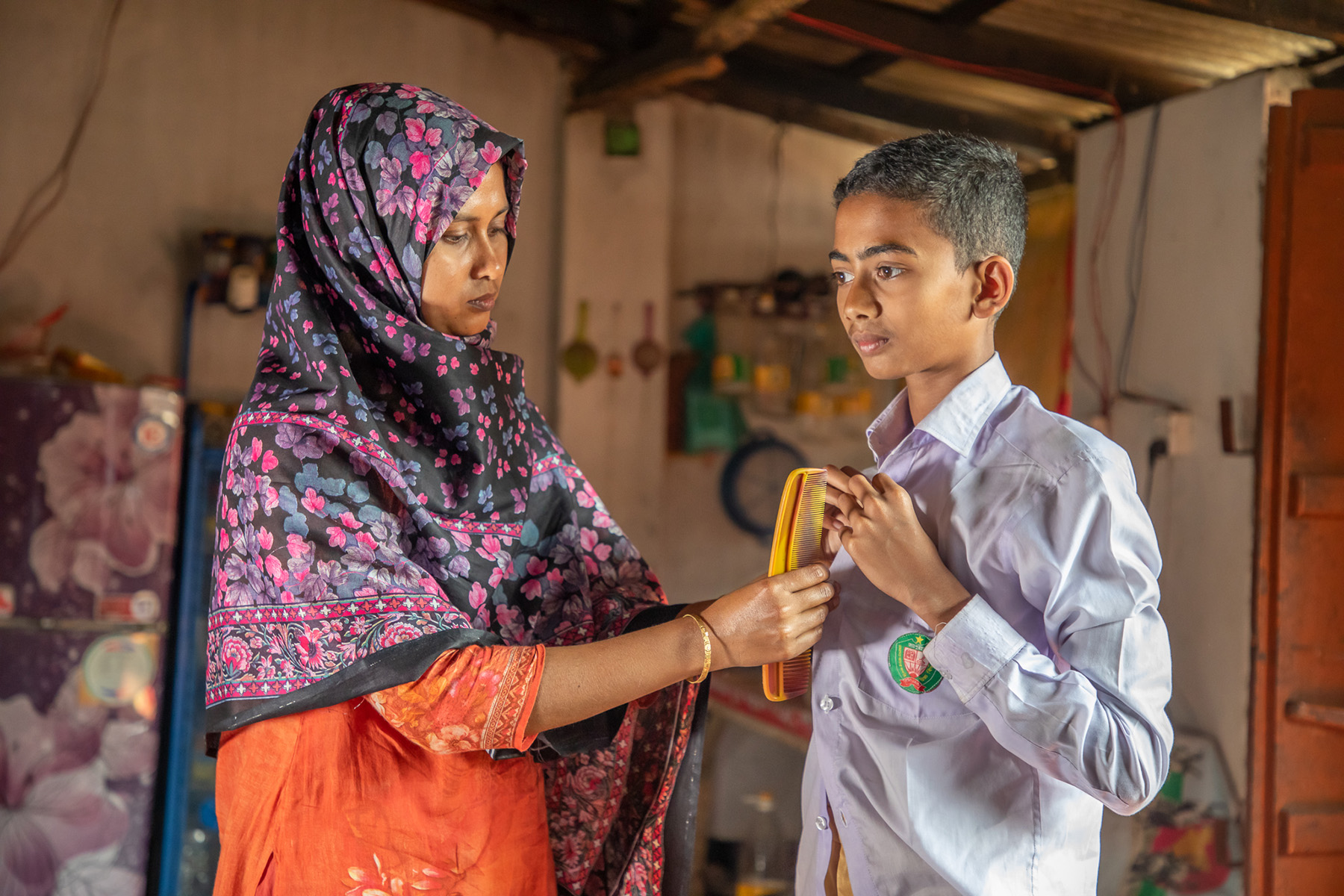
Moushumi Akhter with her son at their home in Bangladesh. Photo credit: Arif Hossain, Farming Future Bangladesh
In 2022, the Feed the Future Insect-Resistant Eggplant Partnership conducted a feasibility study into the viability of plant nurseries to improve women’s participation and foster economic empowerment. The study indicated that plant nurseries offered women robust income-earning potential and diversified economic opportunities. And as seedling providers, the women entrepreneurs could establish a handhold on a critical link of the food security value chain. IREP constructed the first of the 19 nurseries in late 2022, with project specialists offering training in crop loss mitigation, marketing strategies, efficient nursery management, and gender to ensure greater women participation.
Significantly, women gained insights into time management and leveraging their resources to diversify their income sources, said Raja Rajeswari, a gender specialist working on the project.
“Every woman entrepreneur learned that effective financial management, marketing, and producing high-quality seedlings are essential to the success of their businesses,” Rajeswari said.
In the Jashore region in the west of Bangladesh near the border with India, 39-year old Ratna Biswas lives with her family of four, including her husband, son, and mother-in-law. She was one of 10 women in the region selected to start a nursery.
“Our family has a rich agricultural heritage that spans generations,” Biswas said. With the nursery program, she for the first time gained direct control over an agricultural business. She initiated meetings with other women entrepreneurs in the area, and the dozens of women now meet monthly and discuss common challenges.
She said that Bt brinjal has proven especially popular with local farmers. Her nursery business has helped to increase her family’s income and solidify their economic situation.
“I am a female entrepreneur. With me and my husband both now earning, we can enjoy a more financially stable and secure lifestyle,” Biswas said.
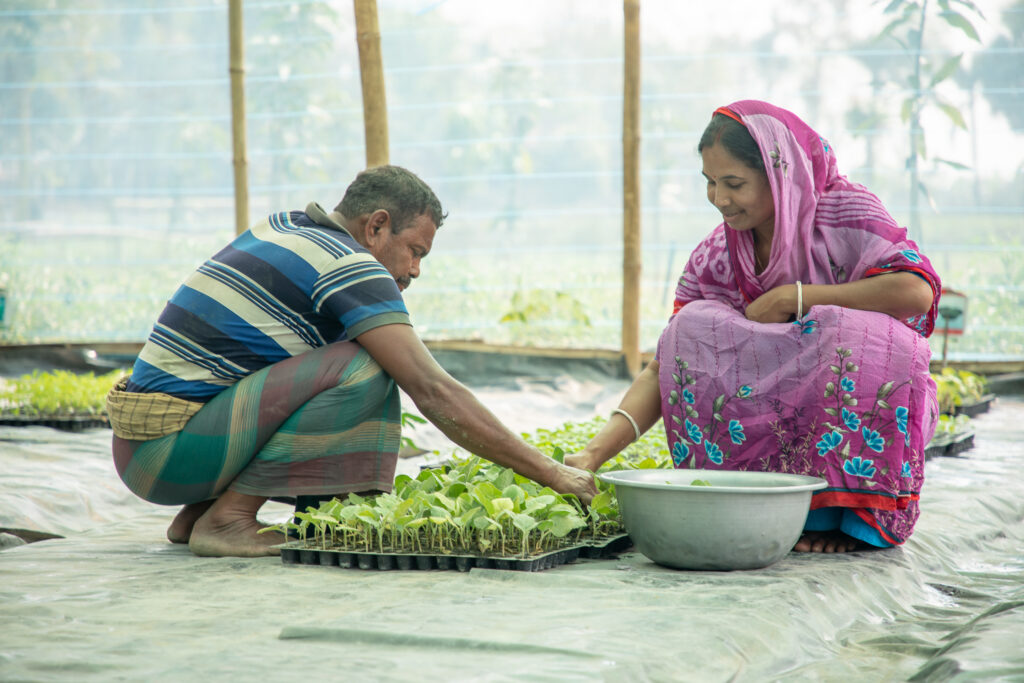
Anima Biswas sells Bt eggplant seedlings to a local farmer. Photo credit: Arif Hossain, Farming Future Bangladesh
The experience of the women in the program demonstrates what country-level data has consistently shown: Empowered women lift their families and communities. Individually, women who have control of their own money re-invest more into household nutrition, health and education than men do. Collectively, women are key to solving hunger: when allowed equal access to land and other inputs, their agricultural yields can increase by 20-30%– the equivalent of feeding up to 150 million more people globally.
Feed the Future, America’s initiative to combat global hunger, has focused on empowering women since 2011, through efforts to increase their access to agricultural inputs and technologies, financial and business services, and household and community decision-making.
The plant nurseries from the Feed the Future Insect-Resistant Eggplant Partnership are providing critical lifelines for women in Bangladesh. Mina Begum is 43 years old and a mother of two daughters and three grandchildren. As a child, she was engaged to a man she had never met at an age when she hardly understood what marriage entailed. After what she described as a difficult relationship, she was able to get a divorce in 2021. In the divorce agreement she received a small home spread over 1/10th of a hectare, a cow, and 10,000 takas (about $92 USD).
Once on her own, Begum worked as a day laborer at a plant nursery run by a local businessman. Getting to work each day took her two hours by autorickshaw at a cost of 60 takas. She earned just 150 takas for her eight-hour shift, and the seasonal employment left her jobless during slow periods of the year. She soon was forced to sell the cow to make ends meet.
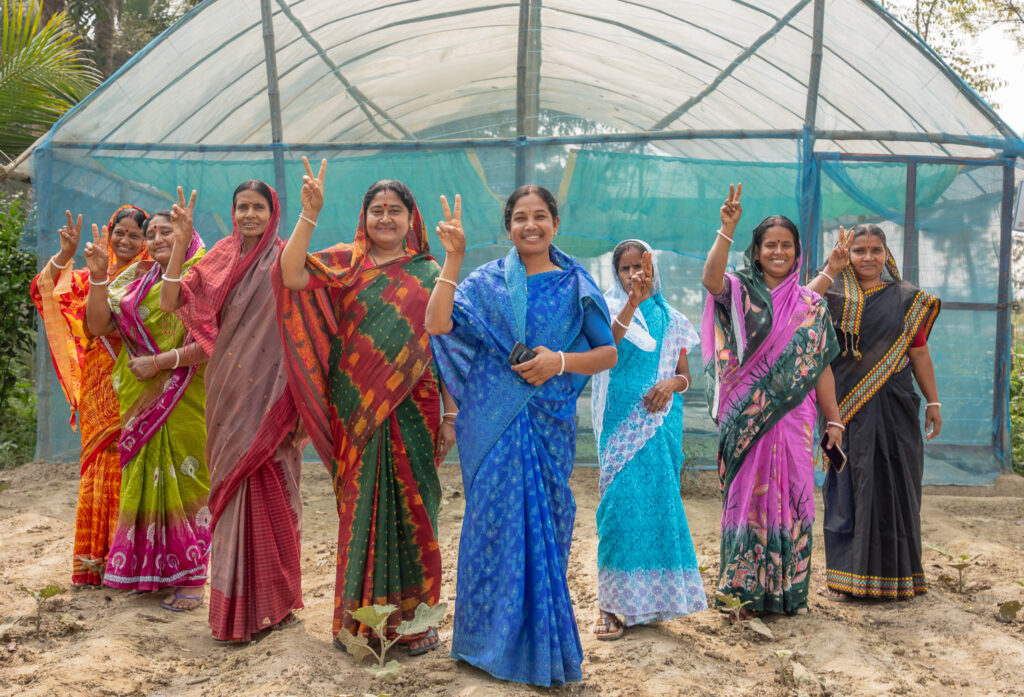
Women entrepreneurs from Jashore. Photo credit: Arif Hossain, Farming Future Bangladesh
With her experience working in a plant nursery, Begum was well positioned to start her own business if given the opportunity. Once selected for the IREP program, she leased two decimals of land in a prominent location near farmers. She planted 20,000 seedlings inside her nursery and demonstration plots outside. She carefully promoted her business first through a door-to-door campaign in the village and by giving a few progressive farmers free saplings.
“The nursery not only made me independent but also made me think outside the box, which I never thought before,” said Begum.
Her marketing techniques proved successful, and she soon sold out of all of her seedlings. After three months running her nursery, she calculated that she only spent four hours per day on the business, leaving her time and money to focus on other ventures. She bought a chicken and a goat and plans to add more livestock and learn garment-making to earn extra income.
Women entrepreneurs like Begum are now taking part in diversified economic opportunities within a critical link of the food security value chain, Acevedo said.
“Advancing gender equality and women’s empowerment is leading to transformations in global food systems,” Acevedo said. “The women taking the lead now in Bangladesh are creating a future where secure, sustainable and equitable food systems are the norm.”



